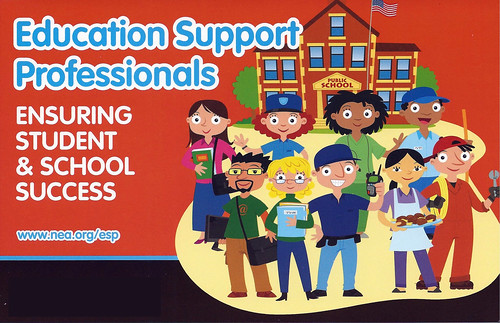
The USDA school meals programs serve well over 30 million students per day, nationwide. We rely on our partners in the education realm to help us ensure that these programs—not only programs of great magnitude, but also of great public health importance—are implemented appropriately so that children are healthy and ready to learn. This week’s guest blog from the National Education Association is a testament to their members’ commitment to student health, and the important role that school nutrition plays.
By Roxanne Dove, Director, National Education Association, Education Support Professionals Quality
The nearly half-million Education Support Professionals (ESPs) who are members of the National Education Association play vital roles in helping to create great public schools for our students. ESPs work as bus drivers, custodians, secretaries, classroom paraeducators, food service staff, and in many other jobs as part of a unified education workforce that helps ensure that children are safe, healthy, well-nourished, and well-educated.
As readers of this blog may know, our country’s youth are facing twin crises of obesity and food insecurity -- limited or uncertain availability of nutritionally adequate and safe foods. Nearly one in three American children are overweight or obese (White House Task Force on Childhood Obesity: Report to the President, 2010) while 16 million face food insecurity (USDA Economic Research Service, 2013). In a sad irony, food insecurity leads to both hunger and obesity. Because they lack access to or can’t afford healthier food, food insecure families may be forced to choose inexpensive, calorie-dense, nutrient-poor foods.
Childhood obesity is linked to a host of physical health problems, including high cholesterol, high blood pressure, and Type 2 diabetes, both when children are young and when they become adults. Overweight and obese children also have lower self-esteem and are more likely to be victims of bullying and social discrimination. There is a growing body of research linking obesity with poorer academic performance.
As educators, NEA members have both the opportunity and the obligation to address these crises. Students may obtain 30% or more of their total calories at school. For some students, the meals and snacks they receive at school may be their only reliable source of food. Good nutrition can help them do well in their classes. Schools can also teach students habits of healthy eating that can serve them for a lifetime.
The National Education Association believes that every student deserves a great public school. A high-quality school nutrition program is not an add-on or ancillary service, but is an integral part of that great school. That is why we strongly support the Healthy, Hunger-Free Kids Act of 2010.
It is not a simple task to operate school nutrition programs that provide students with nutritious meals, while dealing with rigorous financial and time constraints. These high-quality programs should have:
- High participation rates for school breakfast and lunch – especially in districts with a high number of students eligible for free and reduced-price meals
- efficient purchasing of food items, supplies and equipment
- efficient production of high-quality meals, including meals cooked from scratch
- student acceptance of and desire for new foods, minimized tray waste, food service integrated with student learning, and family and community support for the food service program
Our Food Service Support Professionals members are not just “lunch ladies” -- they are skilled and dedicated professionals doing difficult jobs. Students succeed when these ESPs are enlisted as partners, bringing their knowledge and personal connections with students and their families to assist with each one of these program elements.
For instance, NEA member Donna West, a school nutrition manager in Scottsboro, Alabama, says that her goals at work have evolved from just making sure she followed all the rules and regulations at the beginning of her career, to helping students make better decisions about both nutrition and manners. “We help them become an overall better citizen,” West explains. “I see my career differently now that I have come to understand that education support professionals are part of the education process,” says West. “I realized that my role in the cafeteria and trying to help the students learn nutrition is just as important as what’s happening in the classrooms.”
The Healthy, Hunger-Free Kids Act of 2010 recognizes the professionalism of food service staff and their need to continually keep up with the changing requirements of school nutrition, by for the first time requiring annual, ongoing professional development for everyone who works in school nutrition programs. We are currently awaiting the issuance by the USDA of the final HHFKA Professional Standards regulations. NEA is looking forward to working with the USDA, school districts, and allies to connect food service ESPs with training that supports their professional needs and aspirations. We want to ensure that this trainings is relevant, accessible, hands-on, and of high-quality. Only working together can we achieve our common goal of having healthy, well-nourished students who are ready to fulfill their potential.



